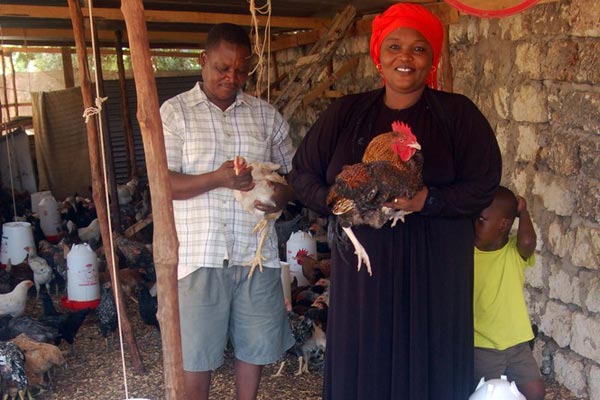Farida Almasi ventured into poultry farming last year in July. She started with 150 Kari Improved Kienyeji chickens that she bought from a seller in Siaya at Sh120 each.
“I got them from far after a friend referred me to the farm, but the move turned out to be expensive. I lost 34 of the chicks due to the long distance.”
Her trouble, however, did not stop there. Other chicks died later after Almasi put them in the brooder and started offering them chick mash.
“At first I thought it was the weather because they had not acclimatised to it. They were dying one or two each day,” says Almasi, who consulted a veterinary officer only to be informed the problem was the feeds.
“I used to buy the mash from an agrovet at an affordable price but the vet informed me the feeds were contaminated with mould. I talked to the agrovet and he advised me to return the feeds only to offer others that had similar problems,” says Almasi, who lost 36 chicks to poor feeds.
Despite losing the birds, the farmer did not give up. She changed her source of feeds and later increased her brood by 500 kuroiler chicks in September, which she bought at Sh120 each.
Almasi has 480 birds in total, but with most of her first brood having died and having sold others at between Sh800 and Sh1,200, only 20 are laying eggs.
She supplements the commercial feeds she offers her chickens with leucaena, a local plant, and moringa leaves, which she mixes with maize bran, cutting down on feeding costs.
Almasi is working on hatching chicks for sale. “A lot of cheap eggs are coming from Uganda and the rest of the country into Mombasa making it hard for us to sell. That is why I am working on buying chicks since the imports cannot do very well here.”
Kilifi County Veterinary Services Director Donald Mwachiru Kiti says that poultry farmers should ensure that the pens are airy and placed in a direction that is against the wind. Kiti says the floor should have sawdust and fumigated regularly to keep diseases at bay.
“Chicks need to be vaccinated against Newcastle disease, fowl pox and gumboro as soon as they are hatched. After three weeks, they require fowl typhoid vaccination.” The vet says farmers should watch out for fake feeds by buying from registered suppliers only.
“In the event that they doubt the quality, the farmers have a right to report to the nearest vet office, the association of feeds manufacturers, Kenya Bureau of Standards and the Veterinary Board for assistance and action to be taken.”









